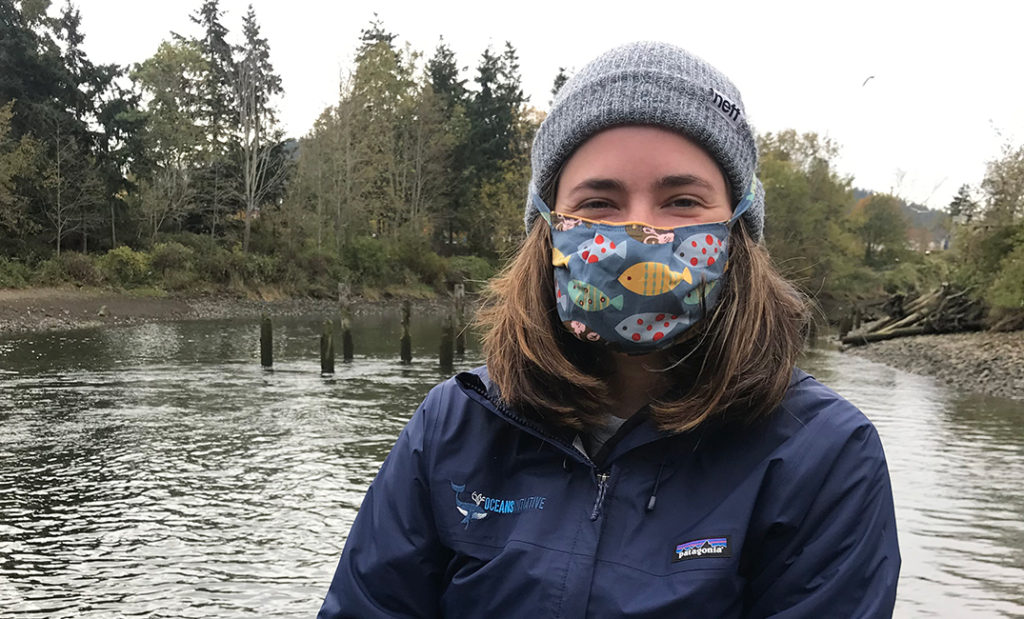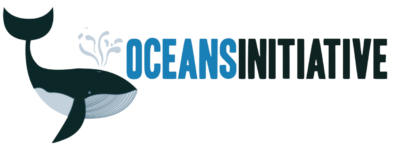By Stephanie Reiss, Oceans Initiative Field Technician

A Chance Encounter with Dolphins
I was on vacation with my family in southern New Jersey staying in a beach house on the shores of the Atlantic ocean. Our back deck opened to the sea, overlooking the grassy dunes with the unmistakable fragrance of the salty ocean air and the sound of waves crashing on the cream-colored sand. My Nana was outside enjoying a sun-kissed afternoon when I heard her shout, “Dolphins! LOOK! There are dolphins!!” My eight-year-old heart suddenly jumped as if it were now at the edge of my throat, and uncontrollable excitement welled from the depths of my gut, leaving me near paralyzed. My head was light and dizzy, the inner voice was ringing, “DOLPHINS. Real, live, dolphins?!”
A moment or two passed before I was able break through the emotion and rush out onto the deck. Sure enough, out in the distance was a pod of common bottlenose dolphins, bounding in and out of the waves. I stood and watched in silence for as long as I could, the last porpoising merely a blip of grey in the sea of blue. For the rest of our stay, each day around that same time, I would stand on the deck, keeping vigilant watch and waiting for them to swim by again. Finally, on the last day, they graced us once more, frolicking just past the breakers as if they were putting on a show and knew we were watching. To me, this was my greatest delight yet, and the highlight of our trip.
My Quest Continued — My Questions Began
After that day, I would search for evidence of whales in any place I could, usually the movies, on TV, or in pictures on the internet. I absorbed as much as I could about this unique, diverse group of animals and I quickly became entranced. I watched a special on killer whale pods and the importance of family and I was awestruck by their social behavior. Where were they? What were they doing? Who knew about them? When could I see one? …were all the questions I was now compelled to answer.
The first killer whales I had ever laid eyes on were Southern Resident Killer Whales K35, Sonata and his mother K16, Opus. I watched from a research boat with my Marine Birds and Mammals college class as K35’s large dorsal breached the surface, and the blows of both whales saturated the air a few kilometers in the distance. My vision blurred as I peered through my binoculars at the magnificent creatures before me, and we shared life-giving breaths. The sheer elation of the moment had become mixed with a heaviness and disquiet. The whales were surrounded by boats filled with onlookers. I had learned about these threatened animals in my classes at the University of Washington and I found myself suddenly lost in a whirl of worry. The knowledge of their quandary laid thick on my mind. Were they finding anything to eat? Were there too many boats around them? Was I contributing to their struggle? From that moment on, the animals of J, K, and L pod, and their plight, had become indelibly tethered in my heart.
Fast-forward to today and I can hardly believe myself to be a scientist, let alone one who makes a living from learning about, observing, and protecting whales. My first project with Oceans Initiative was the Southern Resident Killer Whale field project, my literal dream job. There were many long hours and days-on-end in the summer sun, early wake-up calls to scan the Salish Sea, and countless numbers of PB and Js for breakfast, lunch, and dinner, but nonetheless, my heart was content with the purpose I had found and the challenging job felt easy.
My Journey Through Doubt to Perseverance
Reaching this dream, believing I was deserving of it, and allowing myself to accept success however, has been far from easy. There is a common phenomenon among early-career scientists, which leads to insecurity, called, “imposter syndrome.” Unfortunately, it is one to which I am all too familiar. No amount of passion, drive, university courses, or papers read could have prepared me for that.
I grew up in a large family of seven, with three brothers and a sister. My parents always encouraged my siblings and me to study hard and pursue our passions through higher education. So, I took this seriously, accepted my fate as a “nerd,” and focused on my grades and academic goal. I also came to realize early on that for a woman, the path to a successful career in science was riddled with obstacles. However, I had many things going for me. I came from a family where both of my parents had professional degrees and my identity, nationality, and race did not place me at any significant disadvantage. Still, the fact remained, careers in science present considerably more challenges to women than men. Knowing this, I became even more determined that nothing was going to stop me.
I continued to study hard, maintain a good GPA, and push myself to engage in scientific activities. I graduated from the University of Washington with a Bachelors of Science in Biology and minor in Marine Biology, but I still felt incomplete. Then, one day my phone started blowing up with a number of different text messages from friends all containing the same thing—a job listing for new whale researchers. The position with Oceans Initiative had only been posted a few days earlier. I hadn’t yet seen it, but apparently many of my friends had. They all thought the same thing: “This was Steph’s dream job!”
More than a Blip of Grey in the Sea
I applied for the role of field technician at Oceans Initiative, quickly learning that I was one in a pool of hundreds of qualified applicants. I felt like one of those Jersey shore dolphins, as if I was just a blip of grey in a sea of blue. I fought back the urge to accept failure and withdraw before I had even entered the race. I was encouraged by those around me, declaring “you are perfect for this”; “you are so worthy of it!”.
The day came when I received the job offer in an email, amid the COVID-19 pandemic when all else felt dreary and lost, and I crumbled to the floor. I FaceTimed my entire family and before the words could even leave my lips, tears began to stream down my face. They screamed, cheered, laughed, and professed their belief in me over and over again. I felt that maybe I really was worthy.
For the longest time, I kept hearing that other inner voice reinforcing imposter syndrome and threatening to reveal to the world that I would never really be good enough with the resulting emotions being overwhelming. To this day, I occasionally hear that voice. Nevertheless, I continue to embrace that inner passion that I felt as a child seeing dolphins for the first time. I have found incredible purpose and resolve in the scientific pursuit and the amazing work we are doing at Oceans Initiative to protect marine wildlife.
Trust your Purpose and Let It Carry You Forward
As an early-career scientist, following my passion and the emotions that fuel it has been the most important thing. When the going gets tough, you must turn inward and allow yourself to feel and reflect on those emotions and to draw on whatever is burning deep inside that drives you. Whether it is a love for whales, a fascination with molecular genetics, a desire to make a difference in the world, let it carry you forward. You may still hear those voices inside that tell you that you are not good enough, or not really a scientist yet, or there is just not a place for you in the world of science and research; you can trust your purpose, unleash your passion, smile and enjoy the journey.
The truth is—and ladies, minorities, disadvantaged individuals this is for you—you are worthy of success in science. You CAN achieve your version of success. You WILL make a difference in this world. We need more scientists like you, and yes, you are a real, tried and true, scientist.
Thank you to Dr. Erin Ashe and Dr. Rob Williams, to my Oceans Initiative teammates and collaborators, to our incredible network of partners, to my limitlessly supportive friends and family, and to a chance encounter with a pod of dolphins so many years ago.
“The only limit to our realization of tomorrow will be our doubts of today.”
— Frankin D. Roosevelt


Dear Stephanie,
My name is Braven. I am 9 yrs old. I want to be a Marine Biologist more than any job in the world, and out of all the Marine Biologist that inspire me, you are one of the biggest ones. I was born in Santa Fe NM but I was born to be on the ocean helping save the planet and marine life for us all. I will be moving to Costa Rica with my mom in the next year to follow my heart. Thank you for sharing yours.
For Life,
Braven